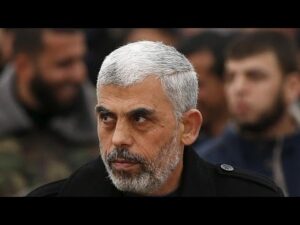The European Council has added Yahia Sinouar, the political leader of Hamas, to the EU terrorist list.
The decision comes as part of EU’s response to the threat posed by Hamas and its brutal and indiscriminate terrorist attacks in Israel on 7th October 2023.
These sanctions are effective immediately.
Following his listing, Yahia Sinouar is subject to the freezing of his funds and other financial assets in EU member states. It is also prohibited for EU operators to make funds and economic resources available to him.
Yahia Sinwar has long been a prominent figure in the leadership of Hamas, the Palestinian political and militant organization that emerged in the late 1980s.
Born in 1962 in the Khan Yunis refugee camp in the Gaza Strip, Sinwar has played a significant role in shaping the direction of Hamas and its activities in the region.
Sinwar’s life has been marked by his involvement in the Palestinian resistance movement from an early age.
He was imprisoned by Israeli authorities for his participation in activities against the occupation during the first intifada in the late 1980s.
Yahia Sinouar spent a total of 22 years in prison, during which he became known for his steadfast commitment to the Palestinian cause.
Upon his release in 2011 as part of a prisoner exchange deal between Hamas and Israel, Sinwar quickly ascended within the ranks of the organization.
His background as a former prisoner and his reputation for unwavering dedication to the resistance made him a respected and influential figure among Hamas members.
Yahia Sinwar assumed the role of leader of Hamas in the Gaza Strip in 2017, succeeding Ismail Haniyeh. As the head of the organization in Gaza, he has been a key player in shaping the group’s political and military strategies.
Under his leadership, Hamas has continued to advocate for Palestinian rights and the end of the Israeli occupation while simultaneously engaging in periodic conflicts with Israel.
One of Sinwar’s notable characteristics is his pragmatism, which has been evident in his approach to dealing with regional and international actors.
While maintaining Hamas’s core principles, he has shown a willingness to engage in diplomatic efforts when it serves the interests of the Palestinian people.
This pragmatism was demonstrated in the context of talks with rival Palestinian faction Fatah, leading to a reconciliation agreement in 2017 aimed at ending the division between the two factions.
However, Sinwar’s leadership has not been without controversy.
Hamas, considered a terrorist organization by several countries and international entities, has faced criticism for its use of violence, including rocket attacks on Israeli civilians.
The group’s tactics and objectives have led to tensions in the region, with periodic escalations in violence, particularly in the Gaza Strip.
Yahia Sinwar’s leadership style and strategic decisions have had a profound impact on the dynamics of the Israeli-Palestinian conflict.
His role in shaping the direction of Hamas reflects the complex nature of the Palestinian struggle for self-determination and the challenges inherent in finding a peaceful resolution to the longstanding conflict in the region.
Hamas: a brief history.
Hamas, an acronym for Harakat al-Muqawama al-Islamiya (Islamic Resistance Movement), has its roots in the Palestinian territories.
Established in 1987 during the First Intifada, a Palestinian uprising against Israeli occupation, Hamas aimed to resist Israeli presence and advocate for the establishment of an independent Palestinian state.
Initially emerging as a social and political entity, Hamas gradually evolved into a militant organization with a military wing, the Izz ad-Din al-Qassam Brigades.
The group gained support through its social services, including schools, hospitals, and charities, particularly in impoverished areas.
However, its inclusion on the U.S. State Department’s list of Foreign Terrorist Organizations reflects the international community’s concerns regarding its armed activities.
Hamas won the 2006 Palestinian legislative elections, leading to its control of the Gaza Strip. This victory intensified tensions with Fatah, the rival Palestinian faction, and ultimately resulted in the 2007 Gaza conflict, leading to the geographical separation of the two factions.
Over the years, Hamas has engaged in both armed conflict and diplomatic efforts, contributing to the complex dynamics of the Israeli-Palestinian conflict.
The group’s history is marked by a combination of resistance against perceived occupation and controversy due to its methods and objectives.
______________________________________________________________________________________________________________________________________

Read also: UK sanctions 4 Hamas senior leaders and 2 Hamas financiers.
The UK sanctions show that the terror group’s leaders cannot escape the consequences of their actions, even if they are pulling the strings from outside of Gaza.
______________________________________________________________________________________________________________________________________

Follow EU Today on social media:
Twitter: @EU_today
Facebook: https://www.facebook.com/EUtoday.net/
https://www.facebook.com/groups/968799359934046
YouTube: https://www.youtube.com/@eutoday1049




